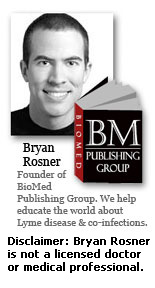Write and Publish a Lyme Disease Book
By Bryan Rosner on Oct 11, 2008 in General News
I wrote this article primarily for physicians, but anyone (advocates, patients, and caretakers) will benefit from reading it. If you would like to submit a Lyme disease book proposal to Lymebook.com/BioMed Publishing Group, do so here: http://www.lymebook.com/submit-book-proposal.
Physicians who specialize in Lyme disease are clearly the best candidates to write books on Lyme disease. The most common reasons that these physicians do not write books (from my discussions with several of them) are the following:
1. “I’m too busy and don’t have time.”
2. “Lyme disease doctors are already being persecuted, and having a published book would be like painting a bulls-eye on my back for all the regulatory agencies to see.”
3. “The treatments I currently use for my patients still require additional testing and trials.”
If you are reading this and you are a physician, my purpose in penning this article is not to convince you to write a book. Instead, I will simply provide what I believe to be reasonable responses to the above questions, based on my experience and research. Disclaimer: Your mileage may vary; this discussion is for informational purposes only.
Let’s begin with the first point. Yes, you are too busy; you are probably too busy to even spend enough time with your family and friends. Perhaps you are worked into the ground and wish you could cut 20 hours per week out of your schedule. Consider this, though: When you retire or die, how is the next generation of doctors going to know all that you have learned? Who will carry the torch? In my opinion, what you leave behind in terms of replicable wisdom is just as important as the clinical help you’ve provided during your career. A book is a good tool for passing on knowledge to the next generation of physicians.
Regarding point number two: yes, this is true, Lyme disease physicians are currently being persecuted and you may be better off not going public. Nevertheless, a few recent developments have worked in your favor if you desire to write a book:
1. Lyme disease is rapidly gaining national attention which may mean that as true science prevails and chronic Lyme disease is seen as a real condition, Lyme physicians may soon be vindicated instead of persecuted.
2. Writing a book is covered by different laws than treating patients. Writing a book falls under 1st amendment protection as freedom of speech / press, so technically, you are not held to the same scrutiny that governs the clinical environment. I have combed the laws on this for hours and it is not completely clear to me how much you can get away with in this regard. It appears that most books are safe. But don’t take my word for it – talk to a lawyer.
3. Thanks to Ken Singleton, M.D., you will not be the first physician to write a book on Lyme disease should you choose to follow through with a book. Dr. Singleton’s excellent book, The Lyme Disease Solution, was published on February 1, 2008. So, Dr. Singleton is essentially a “test case,” and we can all watch and see how it plays out. I would like to thank Dr. Singleton for his bravery and immense contribution to the Lyme disease community. His book is a tremendous asset to us all. James Schaller, M.D., is another brave physician pioneer who has “gone public.”
Moving on to point number three: Indeed, your clinical and research experience is not 100% complete and accurate; if it were, you would have found a cure for Lyme disease already. So, the real question is not whether you have all the answers for your book, but instead, whether or not the information you’ve collected over your medical career is worth sharing. The answer is almost certainly yes. If you have had success treating Lyme disease (even without a 100% cure rate), other physicians and patients can benefit from that knowledge. If you have not had success, benefit can also be gleaned from your mistakes. Most likely it is a combination of the two (success and failure), and your knowledge will provide a road map for those to come.
Should you write a book? Making the decision to do so is very personal. The project takes hundreds of hours. You need your family’s support, and if you are going to take time off work so as not to increase your workload, you may lose income. Only you and your loved ones can make the decision (and maybe your lawyer can help!).
I am the author of four Lyme disease books and I also own BioMed Publishing Group and have been publishing Lyme-related literature full time since 2004. If you would like to speak more about this topic, call me at (530) 541-7200. Or, visit my website at www.LymeBook.com. Submit a book proposal at www.LymeBook.com/submit-book-proposal.








